Global Blockchain Market: By Type, By Offering, By Enterprise Size, By Application, By Industry Vertical, By Region & Segmental Insights Trends and Forecast, 2024 – 2034
- Industry: Technology
- Report ID: TNR-110-1135
- Number of Pages: 420
- Table/Charts : Yes
- June, 2024
- Base Year : 2024
- No. of Companies : 10+
- No. of Countries : 29
- Views : 10211
- Covid Impact Covered: Yes
- War Impact Covered: Yes
- Formats : PDF, Excel, PPT
Blockchain is a decentralized, distributed ledger technology that enables the secure recording, storing, and sharing of digital transactions across a network of computers, known as nodes. In essence, it consists of a series of interconnected blocks, each containing a cryptographic hash of the previous block, transaction data, and a timestamp. This structure ensures the integrity and immutability of the data, as any attempt to alter a block would require the consensus of the majority of the network participants, making it highly resistant to tampering or unauthorized changes.
Blockchain technology eliminates the need for intermediaries by enabling peer-to-peer transactions, thereby reducing costs, enhancing transparency, and increasing trust among participants. With its decentralized nature and cryptographic security features, blockchain finds applications in various sectors, including finance, supply chain management, healthcare, voting systems, and identity verification, revolutionizing processes, and unlocking new opportunities for innovation and collaboration in the digital age.
The demand for blockchain technology is driven by several key factors shaping its adoption and growth across industries worldwide. Firstly, the increasing need for transparent and secure digital transactions fuels demand for blockchain solutions, which offer immutable records of data and transactions, reducing the risk of fraud and tampering. Additionally, the rise of decentralized finance (DeFi) applications, including cryptocurrency exchanges, lending platforms, and decentralized autonomous organizations (DAOs), drives demand for blockchain technology as the backbone of these innovative financial systems.
Moreover, the growing interest in supply chain transparency and traceability motivates businesses to adopt blockchain solutions for tracking and verifying the provenance of goods, ensuring authenticity and compliance with regulatory standards. Furthermore, the potential for blockchain to streamline complex business processes, reduce administrative overheads, and facilitate cross-border transactions accelerates its adoption in various sectors, including finance, healthcare, logistics, and government, positioning blockchain as a transformative technology driving digital transformation and innovation in the global economy.
In terms of revenue, the global blockchain market was worth US$ 17.6 Bn in 2023, anticipated to witness CAGR of 56.2% during 2024 – 2034.
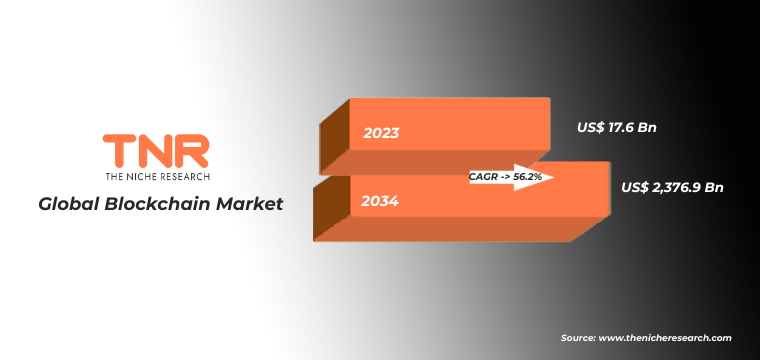
Global Blockchain Market Dynamics
Increasing Adoption Across Industries: The growing recognition of blockchain’s potential to revolutionize business processes, enhance transparency, and reduce costs fosters adoption across industries such as finance, supply chain, healthcare, and government. Ongoing advancements in blockchain technology, such as scalability improvements, interoperability solutions, and enhanced privacy features, drive innovation and expand the potential applications of blockchain across various industries.
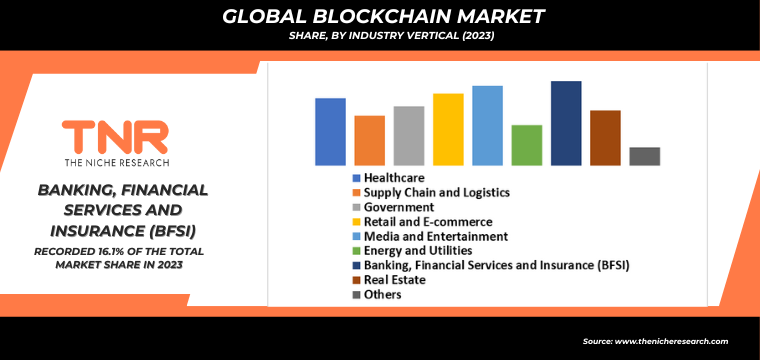
Rising Demand for Decentralized Finance (DeFi): The surge in interest in decentralized finance (DeFi) applications, including decentralized exchanges, lending platforms, and stablecoins, drives demand for blockchain solutions that enable secure and transparent financial transactions without intermediaries. Growing concerns about data security, privacy, and trust in centralized systems drive interest in blockchain solutions, which offer enhanced security, transparency, and immutability of data.
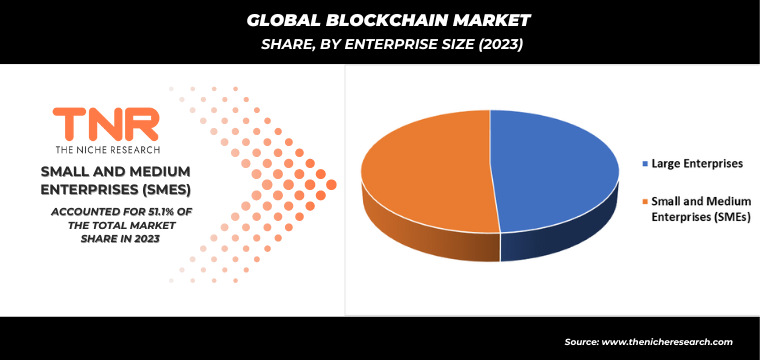
Global Economic Uncertainty: Economic uncertainties, geopolitical tensions, and currency fluctuations fuel interest in blockchain-based assets such as cryptocurrencies as alternative investment options and stores of value. Increasing awareness of the environmental impact of blockchain mining activities, particularly for proof-of-work (PoW) consensus mechanisms, drives demand for more sustainable and energy-efficient blockchain solutions. Regulatory clarity and supportive policies regarding blockchain and cryptocurrencies impact market dynamics by providing a conducive environment for investment, innovation, and mainstream adoption of blockchain solutions.
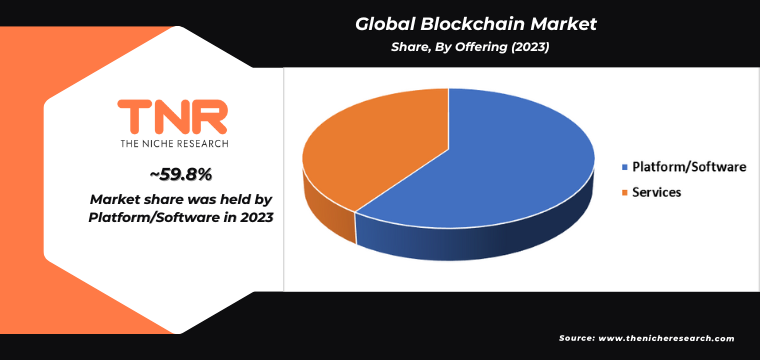
Private Segment has Garnered Major Market Share in the Global Blockchain Market During the Forecast Period (2024 – 2034).
The demand for private blockchain solutions is fueled by several key drivers, particularly in industries where data privacy, security, and control are paramount. Firstly, private blockchains offer enhanced confidentiality by restricting access to authorized participants, making them appealing to sectors such as finance, healthcare, and government, where sensitive data handling is crucial. Additionally, the need for efficient and secure data management solutions drives demand for private blockchains, enabling organizations to streamline processes, reduce costs, and mitigate risks associated with centralized databases.
Furthermore, regulatory compliance requirements, such as GDPR in Europe or HIPAA in healthcare, incentivize businesses to adopt private blockchain solutions to ensure data protection and regulatory adherence. Moreover, the growing recognition of blockchain’s potential to revolutionize supply chain management, identity verification, and asset tokenization further accelerates demand for private blockchain networks tailored to specific enterprise needs. These factors collectively position private blockchain technology as a key enabler of digital transformation and innovation in various industries worldwide.
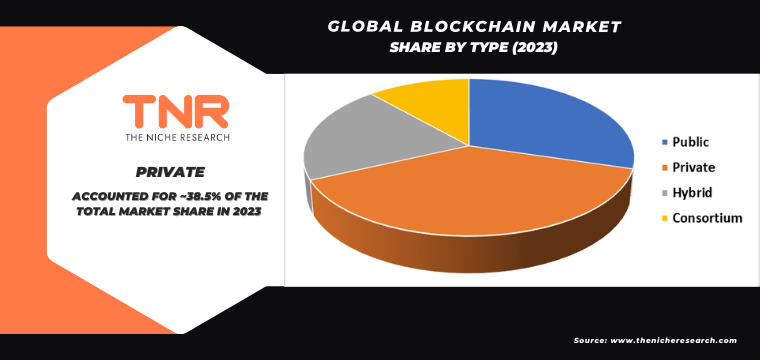
By Application Payment and Transaction Segment had the Highest Share in the Global Blockchain Market in 2023.
The demand for blockchain technology in payments and transactions is propelled by several key drivers reshaping the financial landscape. Firstly, blockchain’s inherent features, such as decentralization, transparency, and immutability, offer significant advantages over traditional payment systems, fostering trust and efficiency in transactions. With blockchain, payments can be executed faster and more securely, reducing processing times and costs associated with intermediaries. Moreover, the growing global adoption of digital payments and the rise of e-commerce fuel the demand for blockchain-based payment solutions, providing users with seamless cross-border transactions and enhanced security against fraud.
Additionally, the increasing interest from financial institutions and governments in exploring central bank digital currencies (CBDCs) and blockchain-based settlement systems further accelerates demand for blockchain technology in payments and transactions. Furthermore, blockchain’s potential to democratize access to financial services and promote financial inclusion for underserved populations drives innovation and investment in blockchain-powered payment solutions, positioning it as a transformative force in the future of finance.
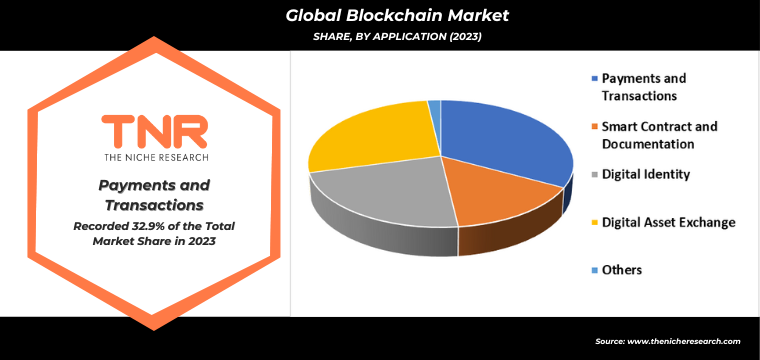
By Region, North America Dominated the Global Blockchain Market in 2023.
In North America, the demand for blockchain technology is driven by several key factors shaping the region’s economic and technological landscape. Firstly, the region’s vibrant startup ecosystem and entrepreneurial spirit fuel innovation and experimentation with blockchain applications across various industries, including finance, supply chain management, and healthcare. Additionally, the presence of established financial institutions and tech giants in North America fosters collaboration and investment in blockchain research and development, further driving market growth.
Moreover, regulatory clarity and government support for blockchain initiatives provide a conducive environment for businesses to explore and adopt blockchain solutions, boosting confidence and investment in the technology. Furthermore, the increasing awareness of blockchain’s potential to enhance transparency, security, and efficiency in digital transactions drives demand from enterprises and consumers alike, positioning North America as a key market for blockchain innovation and adoption in the global landscape.
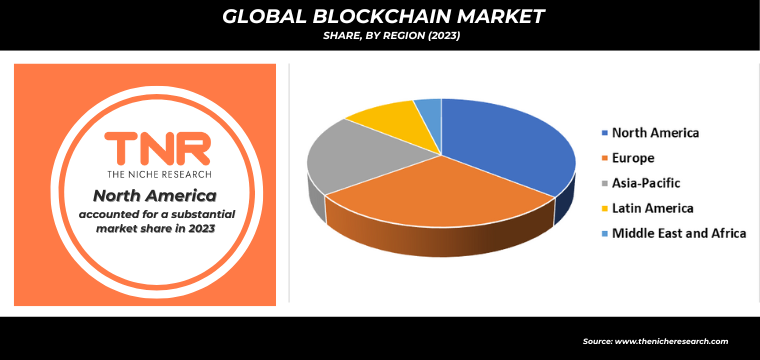
Competitive Landscape: Global Blockchain Market:
- Altoros
- BlockCypher, Inc.
- CONSENSYS
- IBM
- Intel Corporation
- Intellectsoft Blockchain Lab
- LeewayHertz
- SAP SE
- Other Industry Participants
Global Blockchain Market Scope
| Report Specifications | Details |
| Market Revenue in 2023 | US$ 17.6 Bn |
| Market Size Forecast by 2034 | US$ 2,376.9 Bn |
| Growth Rate (CAGR) | 56.2% |
| Historic Data | 2016 – 2022 |
| Base Year for Estimation | 2023 |
| Forecast Period | 2024 – 2034 |
| Report Inclusions | Market Size & Estimates, Market Dynamics, Competitive Scenario, Trends, Growth Factors, Market Determinants, Key Investment Segmentation, Product/Service/Solutions Benchmarking |
| Segments Covered | By Type, By Offering, By Enterprise Size, By Application, By Industry Vertical, By Region |
| Regions Covered | North America, Europe, Asia Pacific, Middle East & Africa, Latin America |
| Countries Covered | U.S., Canada, Mexico, Rest of North America, France, The UK, Spain, Germany, Italy, Nordic Countries (Denmark, Finland, Iceland, Sweden, Norway), Benelux Union (Belgium, The Netherlands, Luxembourg), Rest of Europe, China, Japan, India, New Zealand, Australia, South Korea, Southeast Asia (Indonesia, Thailand, Malaysia, Singapore, Rest of Southeast Asia), Rest of Asia Pacific, Saudi Arabia, UAE, Egypt, Kuwait, South Africa, Rest of Middle East & Africa, Brazil, Argentina, Rest of Latin America |
| Key Players | Altoros, BlockCypher, Inc., CONSENSYS, IBM, Intel Corporation, Intellectsoft Blockchain Lab, LeewayHertz, SAP SE |
| Customization Scope | Customization allows for the inclusion/modification of content pertaining to geographical regions, countries, and specific market segments. |
| Pricing & Procurement Options | Explore purchase options tailored to your specific research requirements |
| Contact Details | Consult With Our Expert
Japan (Toll-Free): +81 663-386-8111 South Korea (Toll-Free): +82-808- 703-126 Saudi Arabia (Toll-Free): +966 800-850-1643 United Kingdom: +44 753-710-5080 United States: +1 302-232-5106 E-mail: askanexpert@thenicheresearch.com
|
Global Blockchain Market
By Type
- Public
- Private
- Hybrid
- Consortium
By Offering
- Platform/Software
- Cloud
- On-premises
- Services
- Consulting
- Development and Integration
- Support and Maintenance
- Others
By Enterprise Size
- Large Enterprises
- Small and Medium Enterprises (SMEs)
By Application
- Payments and Transactions
- Smart Contract and Documentation
- Digital Identity
- Digital Asset Exchange
- Others
By Industry Vertical
- IT and Telecom
- Healthcare
- Supply Chain and Logistics
- Government
- Retail and E-commerce
- Media and Entertainment
- Energy and Utilities
- Banking, Financial Services and Insurance (BFSI)
- Real Estate
- Others
By Region
- North America (U.S., Canada, Mexico, Rest of North America)
- Europe (France, The UK, Spain, Germany, Italy, Nordic Countries (Denmark, Finland, Iceland, Sweden, Norway), Benelux Union (Belgium, The Netherlands, Luxembourg), Rest of Europe)
- Asia Pacific (China, Japan, India, New Zealand, Australia, South Korea, Southeast Asia (Indonesia, Thailand, Malaysia, Singapore, Rest of Southeast Asia), Rest of Asia Pacific)
- Middle East & Africa (Saudi Arabia, UAE, Egypt, Kuwait, South Africa, Rest of Middle East & Africa)
- Latin America (Brazil, Argentina, Rest of Latin America)
Report Layout:
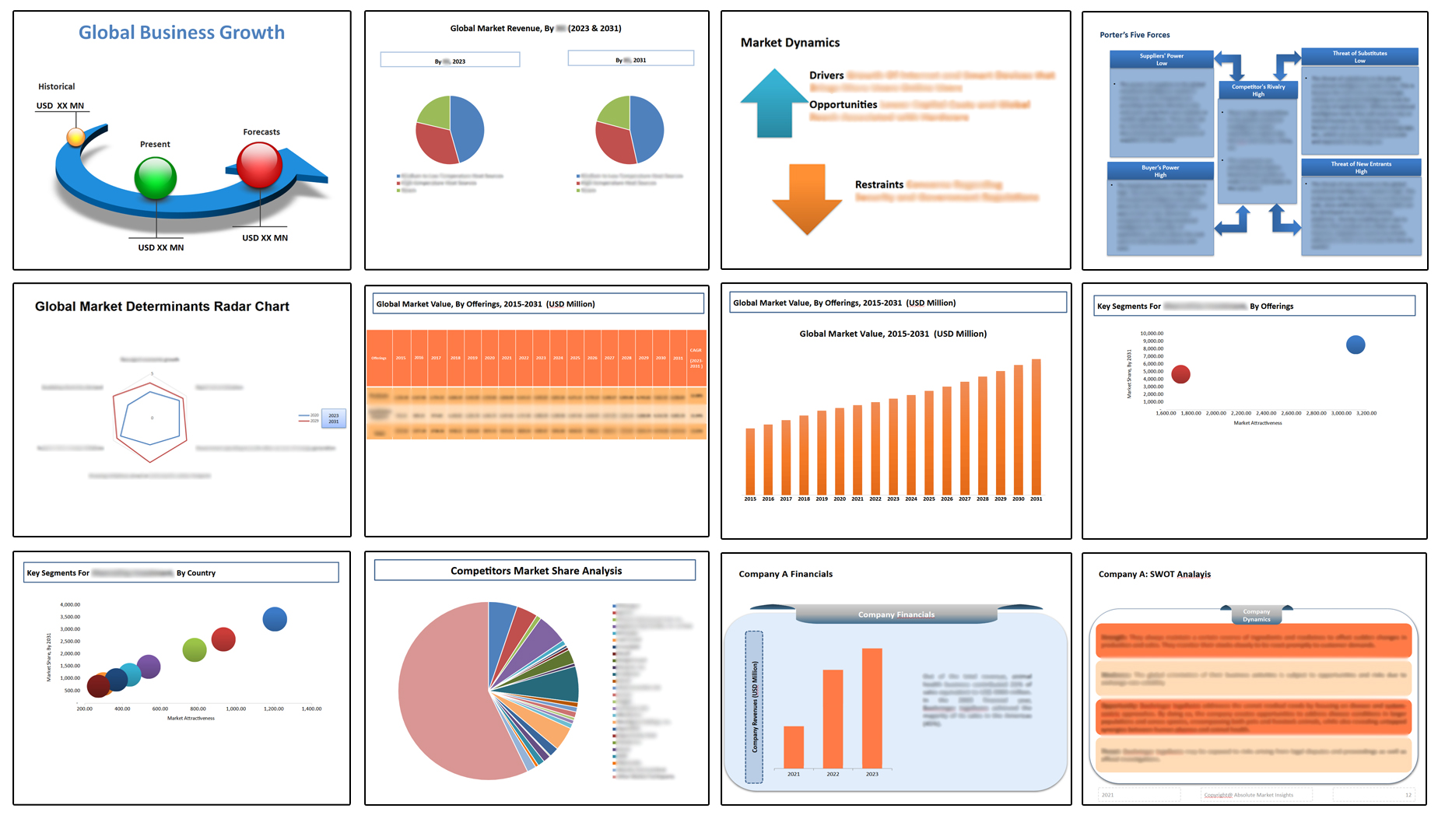
Table of Contents
Note: This ToC is tentative and can be changed according to the research study conducted during the course of report completion.
**Exclusive for Multi-User and Enterprise User.
Global Blockchain Market
By Type
- Public
- Private
- Hybrid
- Consortium
By Offering
- Platform/Software
- Cloud
- On-premises
- Services
- Consulting
- Development and Integration
- Support and Maintenance
- Others
By Enterprise Size
- Large Enterprises
- Small and Medium Enterprises (SMEs)
By Application
- Payments and Transactions
- Smart Contract and Documentation
- Digital Identity
- Digital Asset Exchange
- Others
By Industry Vertical
- IT and Telecom
- Healthcare
- Supply Chain and Logistics
- Government
- Retail and E-commerce
- Media and Entertainment
- Energy and Utilities
- Banking, Financial Services and Insurance (BFSI)
- Real Estate
- Others
By Region
- North America (U.S., Canada, Mexico, Rest of North America)
- Europe (France, The UK, Spain, Germany, Italy, Nordic Countries (Denmark, Finland, Iceland, Sweden, Norway), Benelux Union (Belgium, The Netherlands, Luxembourg), Rest of Europe)
- Asia Pacific (China, Japan, India, New Zealand, Australia, South Korea, Southeast Asia (Indonesia, Thailand, Malaysia, Singapore, Rest of Southeast Asia), Rest of Asia Pacific)
- Middle East & Africa (Saudi Arabia, UAE, Egypt, Kuwait, South Africa, Rest of Middle East & Africa)
- Latin America (Brazil, Argentina, Rest of Latin America)
The Niche Research approach encompasses both primary and secondary research methods to provide comprehensive insights. While primary research is the cornerstone of our studies, we also incorporate secondary research sources such as company annual reports, premium industry databases, press releases, industry journals, and white papers.
Within our primary research, we actively engage with various industry stakeholders, conducting paid interviews and surveys. Our meticulous analysis extends to every market participant in major countries, allowing us to thoroughly examine their portfolios, calculate market shares, and segment revenues.
Our data collection primarily focuses on individual countries within our research scope, enabling us to estimate regional market sizes. Typically, we employ a bottom-up approach, meticulously tracking trends in different countries. We analyze growth drivers, constraints, technological innovations, and opportunities for each country, ultimately arriving at regional figures.Our process begins by examining the growth prospects of each country. Building upon these insights, we project growth and trends for the entire region. Finally, we utilize our proprietary model to refine estimations and forecasts.
Our data validation standards are integral to ensuring the reliability and accuracy of our research findings. Here’s a breakdown of our data validation processes and the stakeholders we engage with during our primary research:
- Supply Side Analysis: We initiate a supply side analysis by directly contacting market participants, through telephonic interviews and questionnaires containing both open-ended and close-ended questions. We gather information on their portfolios, segment revenues, developments, and growth strategies.
- Demand Side Analysis: To gain insights into adoption trends and consumer preferences, we reach out to target customers and users (non-vendors). This information forms a vital part of the qualitative analysis section of our reports, covering market dynamics, adoption trends, consumer behavior, spending patterns, and other related aspects.
- Consultant Insights: We tap into the expertise of our partner consultants from around the world to obtain their unique viewpoints and perspectives. Their insights contribute to a well-rounded understanding of the markets under investigation.
- In-House Validation: To ensure data accuracy and reliability, we conduct cross-validation of data points and information through our in-house team of consultants and utilize advanced data modeling tools for thorough verification.
The forecasts we provide are based on a comprehensive assessment of various factors, including:
- Market Trends and Past Performance (Last Five Years): We accurately analyze market trends and performance data from preceding five years to identify historical patterns and understand the market’s evolution.
- Historical Performance and Growth of Market Participants: We assess the historical performance and growth trajectories of key market participants. This analysis provides insights into the competitive landscape and individual company strategies.
- Market Determinants Impact Analysis (Next Eight Years): We conduct a rigorous analysis of the factors that are projected to influence the market over the next eight years. This includes assessing both internal and external determinants that can shape market dynamics.
- Drivers and Challenges for the Forecast Period:Identify the factors expected to drive market growth during the forecast period, as well as the challenges that the industry may face. This analysis aids in deriving an accurate growth rate projection.
- New Acquisitions, Collaborations, or Partnerships: We keep a close watch on any new acquisitions, collaborations, or partnerships within the industry. These developments can have a significant impact on market dynamics and competitiveness.
- Macro and Micro Factors Analysis:A thorough examination of both macro-level factors (e.g., economic trends, regulatory changes) and micro-level factors (e.g., technological advancements, consumer preferences) that may influence the market during the forecast period.
- End-User Sentiment Analysis: To understand the market from the end-user perspective, we conduct sentiment analysis. This involves assessing the sentiment, preferences, and feedback of the end-users, which can provide valuable insights into market trends.
- Perspective of Primary Participants: Insights gathered directly from primary research participants play a crucial role in shaping our forecasts. Their perspectives and experiences provide valuable qualitative data.
- Year-on-Year Growth Trend: We utilize a year-on-year growth trend based on historical market growth and expected future trends. This helps in formulating our growth projections, aligning them with the market’s historical performance.
Research process adopted by TNR involves multiple stages, including data collection, validation, quality checks, and presentation. It’s crucial that the data and information we provide add value to your existing market understanding and expertise. We have also established partnerships with business consulting, research, and survey organizations across regions and globally to collaborate on regional analysis and data validation, ensuring the highest level of accuracy and reliability in our reports.









